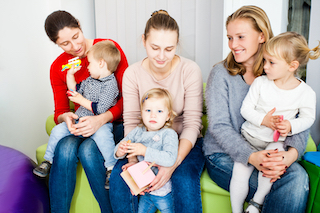 A United States national survey about postpartum depression (PPD) was recently conducted by non-profit organization, HealthyWomen.org and sponsored by Sage Therapeutics. Approximately one in nine new mothers suffer from PPD, the most common complication of childbirth.
A United States national survey about postpartum depression (PPD) was recently conducted by non-profit organization, HealthyWomen.org and sponsored by Sage Therapeutics. Approximately one in nine new mothers suffer from PPD, the most common complication of childbirth.
A total of 1064 women aged 18-49 completed the online survey between September 27 and October 10, 2018. Women who were either pregnant or planning to become pregnant were surveyed in order to identify the perception and level of awareness of PPD.
The women were asked questions about their understanding of PPD symptoms, their thoughts on PPD stigma, their knowledge of treatment options for PPD, and their willingness to discuss PPD with a health care provider.
“While we see that more and more women are speaking openly and publicly about PPD, we also know that there is still a need to raise awareness about the condition,” registered nurse and CEO of HealthyWomen, Beth Battaglino told us. “As a nurse in maternal child health, I know that some women and/or their family members don’t always understand or recognize the signs and symptoms of PPD like mood swings, excessive crying, difficulty bonding with the baby – such as not wanting to hold or touch the baby – excessive fatigue, and in extreme cases, thoughts of harming themselves or their babies.”
Battaglino explained that there are three specific data points to glean from the survey that are significant as far as importance of awareness and PPD stigma. Ninety-one per cent of women surveyed agreed that there is an unneeded pressure on mothers to hide struggles, anxieties and sadness that may accompany motherhood. Twenty-nine per cent of survey respondents who are pregnant or have babies report that their health care provider did not ask if they were experiencing PPD symptoms. Fifty-one per cent of women surveyed who have been diagnosed with PPD think it is an embarrassing diagnosis to receive.
“I am not surprised by the response regarding feelings of unneeded pressure on mothers to hide their struggles, nor am I surprised that some women are embarrassed by their PPD diagnosis,” Battaglino told us. “This should be a joyous, beautiful time, but if moms are having feelings of sadness, anxiety or harm, they may not understand that what they’re experiencing is a medical condition. These women need support and help from their partners, family members and friends.”
Battaglino says she was surprised that 29 per cent of survey respondents who are pregnant or have babies report that their health care providers did not ask if they were experiencing PPD symptoms, especially since this is a conversation health care providers are required to have upon discharge when mom and baby leave the hospital. Battaglino says this conversation should also happen during the six week follow-up visit.
“Women need to feel like they can start the conversation with their health care provider,” Battaglino told us. “If mom is unable to recognize what she is going through or is struggling to share her feelings, family members and friends should show support, look for and recognize signs and symptoms, and make that phone call and take her to her health care provider. It is all about support.”
According to Battaglino, the survey results clearly show the need for an increased understanding of PPD and more dialogue. Specifically, she says, there needs to be more education and awareness that PPD is a medical condition that needs to be treated, and not something you can prevent or something that is just ‘in a woman’s head.’
“While it isn’t preventable, it is treatable, and women and their health care providers should discuss a treatment plan together, which may include medication, support groups, talk therapy, or a combination of these,” Battaglino told us. “If we are able to increase dialogue and shift the conversation and communicate to both mothers and their families, as well as society, that it is a medical condition that can be recognized and treated appropriately, that is the first step in removing the stigma and helping women get the help and support they need during what should be a very special time in their lives.”
Patricia Tomasi is a mom, maternal mental health advocate, journalist, and speaker. She writes regularly for the Huffington Post Canada, focusing primarily on maternal mental health after suffering from severe postpartum anxiety twice. You can find her Huffington Post biography here. Patricia is also a Patient Expert Advisor for the North American-based, Maternal Mental Health Research Collective and is the founder of the online peer support group - Facebook Postpartum Depression & Anxiety Support Group - with over 1500 members worldwide. Blog: www.patriciatomasiblog.wordpress.com
Email: tomasi.patricia@gmail.com